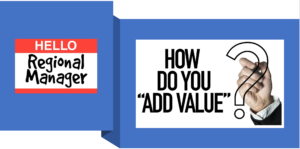
The role of the manufacturer regional manager has been challenged, and redefined, during and since Covid. Whereas it was to be a facilitator and “face of factory” prior to Covid, the question now asked is “what is their value proposition” given that companies are striving to do more with less, virtual meetings have become part of everyday life, and distributor consolidation is effectively blurring traditional regional lines.
These issues are facing every construction trade.
Recently, Desiree Grace, President, Americas, Cembre, Inc., shared thoughts with ElectricalTrends, another service of Channel Marketing Group, and I thought it had direct application for the HVAC/R industry, so we wanted to share it with you.
Desires has extensive experience as a manufacturer having worked with a large, medium, and now a relatively small (at least in the US) manufacturer. She previously shared thoughts on how manufacturers can improve their annual planning process by localizing their information gathering and truly partnering with their sales organizations to gain local information, hence enabling the plan to be tailored to the market … and the projections to be representative of a local marketplace with ElectricalTrends readers.
 Desiree shared her thoughts, based upon her experience, on to optimize Regional Manager performance. In talking with manufacturer management and representative management, the role of regional managers has evolved, and Covid required today’s regional managers to learn new skills. In the words of many, “they had to deliver more value.” Desiree shares thoughts on “how”.
Desiree shared her thoughts, based upon her experience, on to optimize Regional Manager performance. In talking with manufacturer management and representative management, the role of regional managers has evolved, and Covid required today’s regional managers to learn new skills. In the words of many, “they had to deliver more value.” Desiree shares thoughts on “how”.
Expectations of Today’s Regional Sales Manager
“While many of the same topics covered in my prior article relating to working with Manufacturer Rep Agencies (MRA) also apply to regional sales management, it’s important to recognize that the expectations of a RSM is different today than pre-Covid. Unfortunately, for us as an industry, many RSMs focused on distributor relationship management with some believing their role was to micro-manage the reps in their territories. Today it is different, or should be.
The question to ask is “Are your regional sales leaders babysitters or hood ornaments, or do they truly add value to your MRAs and your customers?”
Let’s talk about how the Regional can become a valued resource at the local level.
- Technical competence. Train your regionals to be knowledgeable, subject matter experts who can bridge the gap between your MRAs who manage numerous lines and your product specialists. If they are trained to handle technical questions, demonstrate products, troubleshoot, train, and add value to the sales calls, you will have a force multiplier. And this is the only way a MRA will feel your RM adds value during a contractor / end-user sales calls.
- Ensure your Regional Managers understand the Rep Agent business model, code of ethics, contract obligations, and commissions. If they don’t understand, they won’t be effective.
- I’ll put in a shameless plug for NEMRA. They have plenty of training resources available, not including the annual conference. On the topic of NEMRA, read to the end to see how I believe you can maximize your investment in the upcoming conference.
- Make sure your MRAs actually want the Regional in their territory. You need to know if they are a dreaded obligation or a welcome addition. If you don’t know, find out. If you learn that they are about as welcome as 3-day old fish, then fix it.
- How? Anonymous polling or surveys can help, aggregating the data, as can ensuring the relationships are broader and deeper than just the Regional. Peer to peer mapping, such as Manufacturer VP of Sales to Rep Agent Principal, and the VP of Sales knowing and nurturing the Supplier Relationship VPs at your top 3 distributors would be a good place to start.
- One best practice is a mutual scorecard. When you rate your rep agents, ask them to rate you, as a manufacturer. And if you, and your RMs, are not familiar with the NEMRA Rep of the Future Report you should read it and use it as a guide to evaluate your reps and as a way for your reps to evaluate how well you are supporting them.
- There is also the traditional methodology of actual in-person conversations and observing body language and facial expression when sussing out how your Regional is actually performing. (Adult beverage truth serum does not hurt, either.)
- Decision-Making Authority. Give your regionals guard rails and the ability to make reasonable exceptions to policy and pricing. Ideally, you hire and train competent businesspeople who have good reasons for their exceptions, and can back up their decisions with an ROI, be it a commercial ROI, a competitive ROI, or some other rational reason. It helps if your Regionals understand not only revenue goals, but other corporate goals. A reasonable amount of transparency and revenue sharing helps. For example, you could rank the overall Gross Margin or Profitability by rep agent within a region. You could give the Regional the authority to discount up to a certain level without requiring prior approval. Your regionals should be able to connect the dots between the rep agent’s revenue goals and their potential to impact his or her overall goals for the region. You should not peanut butter spread growth goals, for example. The team in a mature market likely won’t see high double digit growth in 2024 unless they land a big project or three. On the other hand, someone in a developmental or previously ignored market could triple the business.
- Share the Wealth – Want all of your agents to benefit from success? Train your Regionals to share best practices. When one of their agents has a major win or launch a successful promotion or generate a conversion, share the success within your agent network. If you had a direct salesforce you would share successes. Why not with your agents? Remember the old sales technique of “ringing the bell” to share success. Your agents need to hear the wins so that they can replicate success … to generate success for all.
- Train your Regionals, especially those new to the role or new to the industry. They should be able to build a localized strategy that aligns with the national and corporate strategy of the manufacturer in collaboration with their rep agents. They should be able to quarterback local opportunities such as a marketing initiative, or a technical training. Make sure they understand the importance of the rep agent org chart and their own org chart. This is a job that requires LEADERSHIP and the ability to influence without a cudgel. DISC training is never a waste, for instance. They must also be trained on your organization … who to go to, who can help the reps, what additional resources can be brought into the market or can support a distributor. Your Regional will need Marketing, Training, Customer Service and Logistics support. Do they know who to go to?
- Independence. There is no reason your regionals cannot make solo sales calls. This demonstrates a commitment to the market, the ability to gather intelligence first-hand, and allows them to pull business into the distributor and/or rep agent. This also goes to the value of building relationships with key end-users and distributors, especially the top tier in the market. Your regional should nurture these relationships without relying on the rep agent to do all the heavy lifting. When the regional gathers local market intelligence unfiltered by the rep agent, there is a greater degree of credibility. The manufacturer regional needs to understand the local market dynamics, at least at a high level. He or she can transmit that information to “corporate.” Finally, who isn’t impressed by a regional that walks an order into a rep agent or distributor? Talk about adding value! Caveat: At the same time, they need to know how to provide feedback to the rep and ensure follow-up, unless they want to be the day-to-day salesperson for the customer / prospect. Essentially, “CRM” (customer relationship management) goes both ways.
TakeAways
Thank you Desiree for sharing your perspective. The role of a RM has changed. Calling on the distributor is only an element of the role. Adding value to the rep relationship is critical whether it be in the field, as a trainer, or as a facilitator.
In speaking with a number of reps and manufacturers, key hallmarks of a successful regional manager include them
- Earning the trust of corporate staff and, importantly, reps
- Being strong communicators and, perhaps more importantly, strong collaborators with their reps as well as internal support departments
- Adding value to the rep relationship
- Being product experts / product trainers
- Which infers that they need to be able to learn a semi-technical product
- This knowledge is tested by Enerlites to ensure product knowledge is obtained.
- Being facilitators / coordinators with the remainder of the company (coordinate among departments, especially Marketing, Quotations and Technical Product Manager)
- Being a valued-resource to rep and “voice of rep / voice of customer” to the company
- Being a coach / consultant to the rep
And if an RM is going to call on anyone directly, make sure they communicate with the rep after the fact. RM track-record on follow-up is “challenging.” The best way to lose a prospect is to not follow-up. Consider it this way … manufacturers want manufacturer reps to provide information into their CRM system. Will manufacturers share RM CRM information with their reps? Communications and a follow-up process is critical if RMs make direct sales calls on specifiers, contractors, or distributors.
With the end of the year coming, and performance reviews expected, manufacturers should consider how they can solicit input from their reps regarding their RMs … and in a “safe” environment so that the reps can be honest without future recriminations (and maybe the only way is to have a 3rd party solicit the input?)



Leave a Reply